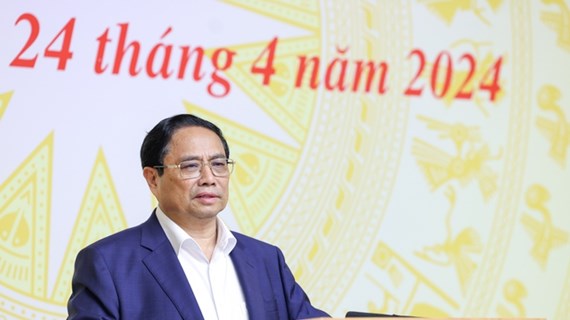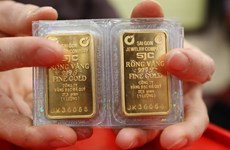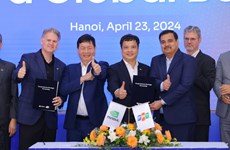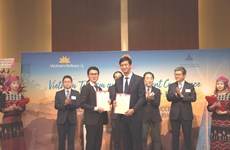Seafood exports to RoK on rise
Seafood export to the Republic of Korea is expected to grow
steadily for the foreseeable future, a representative of the Vietnam
Association of Seafood Exporters and Producers (VASEP) said at a seminar
in HCM City on December 12.
Seafood export to the Republic of Korea is expected to grow
steadily for the foreseeable future, a representative of the Vietnam
Association of Seafood Exporters and Producers (VASEP) said at a seminar
in HCM City on December 12.
Trinh Nam Phuong said that the RoK is at present the fourth largest importer of Vietnamese seafood after the US, EU and Japan. It is also the second largest importer of Vietnamese cuttlefish and octopus after Japan.
Seafood exports to the RoK market reached 421.49 million USD in the first 10 months of the year, up eight percent compared to the same period last year, with shrimp, cuttlefish, octopus, and bivalve mollusks being main items, Phuong said.
In recent years, the RoK has reduced exploitation of tuna in its sea areas and increased import of the fish from other countries.
It now imports tuna from 27 countries, with China , Vietnam , Japan , the US and Thailand being main suppliers.
"Demand for tuna in the RoK is expected to increase in the future, offering a great opportunity for Vietnamese firms," she said.
Vietnam's shrimp export to the RoK has also gone up significantly in recent years.
Under the ASEAN – RoK Free Trade Agreement (AKFTA), Vietnam sees more opportunities to increase seafood exports to the RoK, she said.
However, to boost seafood exports further, exporters should enhance product quality to raise their competitiveness and effect technology transfers, particularly in post-harvest technology, she added.
In the near future, Vietnamese firms will have more competitors in the market, Phuong said, reiterating that this required local firms to conduct research on market demand and provide suitable products.
Ho Quang Trung, head of the Ministry of Industry and Trade's International Cooporation Department, said preferential treatments to export goods under the ASEAN-Korea Free Trade Agreement are applied only when criteria for clear evidence of origin are met.-VNA
Local exporters therefore must study carefully these criteria, check tariff rates as well as procedures in order to benefit from preferential tariffs under this pact, he said
Trinh Nam Phuong said that the RoK is at present the fourth largest importer of Vietnamese seafood after the US, EU and Japan. It is also the second largest importer of Vietnamese cuttlefish and octopus after Japan.
Seafood exports to the RoK market reached 421.49 million USD in the first 10 months of the year, up eight percent compared to the same period last year, with shrimp, cuttlefish, octopus, and bivalve mollusks being main items, Phuong said.
In recent years, the RoK has reduced exploitation of tuna in its sea areas and increased import of the fish from other countries.
It now imports tuna from 27 countries, with China , Vietnam , Japan , the US and Thailand being main suppliers.
"Demand for tuna in the RoK is expected to increase in the future, offering a great opportunity for Vietnamese firms," she said.
Vietnam's shrimp export to the RoK has also gone up significantly in recent years.
Under the ASEAN – RoK Free Trade Agreement (AKFTA), Vietnam sees more opportunities to increase seafood exports to the RoK, she said.
However, to boost seafood exports further, exporters should enhance product quality to raise their competitiveness and effect technology transfers, particularly in post-harvest technology, she added.
In the near future, Vietnamese firms will have more competitors in the market, Phuong said, reiterating that this required local firms to conduct research on market demand and provide suitable products.
Ho Quang Trung, head of the Ministry of Industry and Trade's International Cooporation Department, said preferential treatments to export goods under the ASEAN-Korea Free Trade Agreement are applied only when criteria for clear evidence of origin are met.-VNA
Local exporters therefore must study carefully these criteria, check tariff rates as well as procedures in order to benefit from preferential tariffs under this pact, he said













